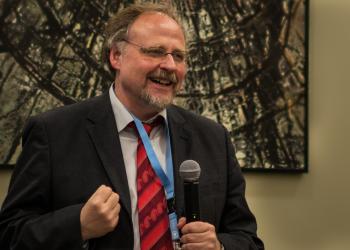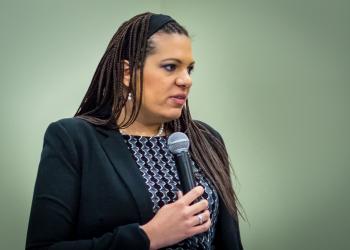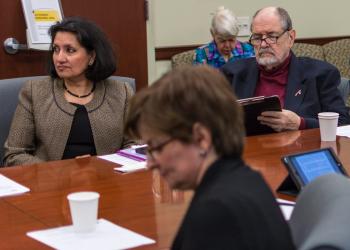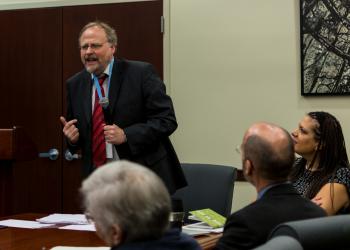UN Experts: the inclusion of minorities can help stem extremism and hatred
Two UN high level experts made a plea today for a greater emphasis on the inclusion of ethnic and religious minorities in the process of governance as an antidote to violence and extremism.
“When you don’t include minorities in the government, you don’t realize how much you are dividing the community,” said Rita Izsak, the UN Special Rapporteur on minority issues.
Heiner Bielefeldt, the Special Rapporteur on freedom of religion or belief, said: “It is to the benefit of everyone to see minorities respected.”
Their remarks came at a briefing for non-governmental organizations, organized by the NGO Committee on Freedom of Religion or Belief and held at the offices of the Baha’i International Community, which co-sponsored the event, along with the International Center for Law and Religious Studies.
Both experts highlighted their belief that the UN and its member states must make greater efforts to ensure that the rights of minorities, both ethnic and religious, are protected at all levels, and not just in a perfunctory manner.
Ms. Izsak said it is not enough for governments just to say “our communities just don’t get along.”
“It is never like that,” said Ms. Izsak. “The biggest issue is the deficit of good governance. Competition for power and resources is normal. The problem is that this is not always a fair competition. Because some groups are excluded at the very beginning from this competition.”
Ms. Izsak said if justice systems, for example, were improved, those who spew ethnic or religious hatred or who manifest corruption on behalf of their ethnic or religious group could be prosecuted. “That could eliminate a lot of hatred,” she said.
Dr. Bielefeldt stressed the importance of using the international human rights framework to bolster protections for minorities – something he said will ultimately also improve life for the majority.
“The minorities are the ones who see the advantage of stressing freedom of religion or belief,” he said. “But it is also to the benefit of majority religions, and that is why one has to form very broad alliances to promote freedom of religion or belief as part of human rights broadly.
“You can’t work on behalf of minorities without addressing the majority,” he said.
Both also spoke about some of the difficulties they face as unpaid experts in the UN system who have very limited resources at their disposal.
Dr. Bielefeldt described how difficult it can be for him as an individual investigator on a country visit to safely talk to those who feel under persecution in the presence of government minders.
He also evaluated the overall impact of his work on promoting change, saying that is the “people on the ground” who make a real difference.
He added that advocacy groups should use the pro-human rights rhetoric of governments as a lever to encourage them to meet the higher standards they promise.
“First, there may be some in the same government who want to go farther,” said Dr. Bielefeldt. “So turn rhetorical statements into binding commitments. Turn it into legal language. Turn it into institutions.”
Ms. Izsak spoke about the limited resources all of the special mandate holders have in publicizing their findings, noting that the UN has only one individual assigned to produced press releases for the entire group of 50 some special rapporteurs.
In her case, Ms. Izsak has turned to social media as an alternate means of getting her message out. “I have my own Facebook and Twitter accounts but it is a struggle,” she said. “And organizing meetings like this one are very important.”
The two hour briefing coincided with the presentation this week to the UN General Assembly of annual reports by Ms. Izsak and Dr. Bielefeldt.
Dr. Bielefeldt’s report this year focused on means to eliminate religious intolerance and discrimination in the workplace, a theme he feels warrants more systematic attention.
“The sources of religious intolerance and discrimination in the workplace can be manifold and include prejudices existing among employers, employees or customers, restrictive interpretations of corporate identity or a general fear of religious diversity,” said Dr. Bielefeldt in his report.
Ms. Izsak this year examined the issue of violence against minorities, noting that “minorities are frequently targets” of violence.
“In order to save lives and ensure peaceful societies, a high priority of stakeholders at all levels must be to improve prevention mechanisms and turn early warning into early action,” said Ms. Izsak in her report.







